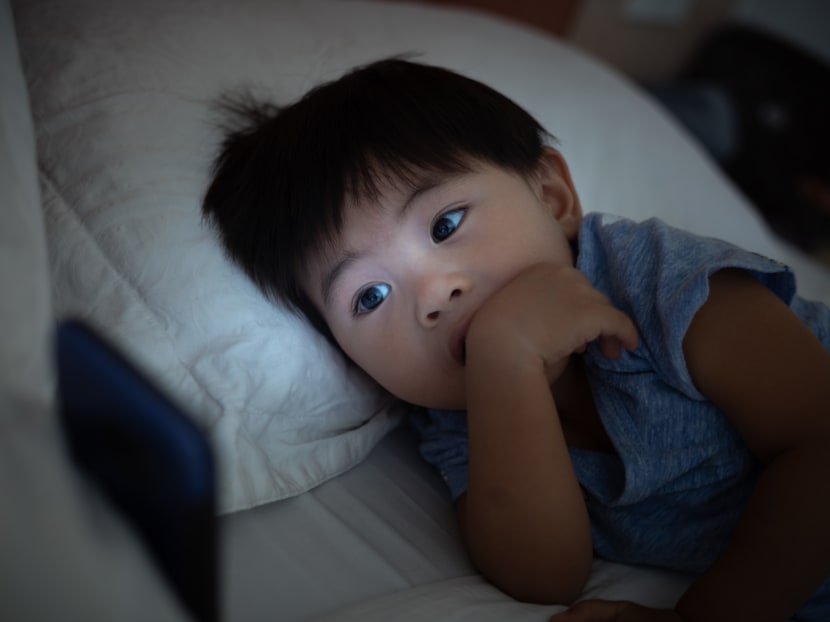Children exposed to digital devices at an early age may have emotional and behavioural difficulties: Study
SINGAPORE — Take heed, parents who resort to using gadgets such as mobile phones, tablets and digital game consoles to keep their children quiet, occupied and entertained.
SINGAPORE — Take heed, parents who resort to using gadgets such as mobile phones, tablets and digital game consoles to keep their children quiet, occupied and entertained.
A study here has shown that children as young as 18 months and below who get their first screen time in front of electronic devices, and even computers and the television, may experience more disrupted sleep as well as emotional and behavioural difficulties.
Researchers from the KK Women’s and Children’s Hospital (KKH) and the National University of Singapore set out to study the effects that exposure to screens have on very young minds. The study was published in the Journal of Developmental and Behavioral Pediatrics earlier this year.
From 2015 to 2017, they looked at 367 preschool children in Singapore aged two to five years with neurodevelopmental disorders such as autism, language delay, global development delay and learning disorders.
Caregivers who attended appointments with their child at the department of child development at KKH were tapped for this study.
The key findings were:
Slightly more than half (52 per cent) of the 367 children surveyed were exposed to screens or had started spending time in front of screens at the age of 18 months or earlier.
More than half also had at least one screen device in their bedrooms.
More than 70 per cent of the children who took part in the study had increased sleep problems, as reported by their parents.
And nearly 60 per cent of the children had clinically significant emotional or behavioural difficulties, as reported by the parents.
Basically, when the children spent time in front of screens, they had disrupted sleep, nightmares, insomnia and so on. This in turn caused them to have emotional and behavioural difficulties, such as tantrums, hyperactivity and an inability to focus.
Most of the children included in the study were Singaporean, male, ethnically Chinese, English-speaking and from middle- and upper-class families where the parents were married.
Dr Mae Wong, senior consultant at the department of child development at KKH who led the study, emphasised the importance of raising awareness on the subject, especially since Singapore has one of the highest smartphone penetration rates in the world.
“The level of public awareness about the detrimental health associations of screen use, sleep and emotional/behavioural difficulties is currently limited.
“Raising parental and general public awareness is necessary to help reduce the negative impact of screen use in young children,” she said.
BEDTIME EXPOSURE
Apart from the information provided by the child’s caregiver, a questionnaire which was an emotional and behavioural survey tool was used for the study.
A higher score on this Strengths and Difficulties Questionnaire indicated higher rates of emotional and behavioural problems. What they found was that two factors accounted for 10 per cent of the worsening of a child’s score on the questionnaire: If the child had been exposed to screen time before 18 months old and had associated sleep disturbances.
This is in comparison with a child who had not been exposed to screen time before 18 months old.
When the child had access to screen devices in the bedroom and associated sleep disturbances, these accounted for 13 per cent of the worsening of the score, in comparison to a child who had not been exposed in similar ways.
Dr Mae Wong said the research team also found that children who had exposure to both “lifestyle factors” — namely screen time before 18 months old and had electronic devices in their bedrooms — reported more sleep disturbances as well as emotional and behavioural difficulties than those who experienced just one of these “lifestyle factors”.
Although the study examined children with neurodevelopmental disorders, the results are applicable to the general population and aligned with existing evidence from studies that have been done on typically developing children, Dr Wong said.
“The results are relevant to the general population as they support the existing body of evidence that poor screen and sleep habits cause negative effects in children.”
For children with neurodevelopmental disorders, they could have more difficulties disengaging from screen use, and the increased usage might further exacerbate their conditions and the problems linked to early screen use.
The researchers said that a longitudinal study would allow for better interpretation of effects over time, in order to study the further development of the child as they grow.












